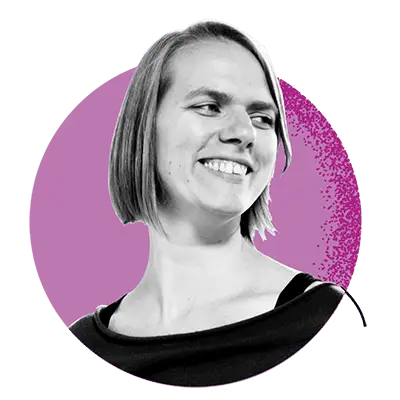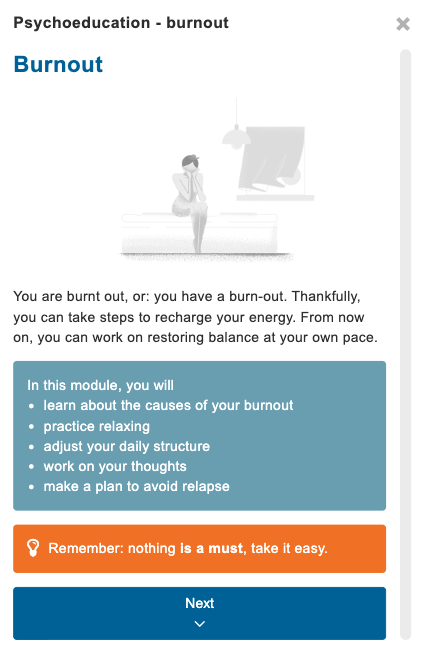Burnt out, what now?
A programme for adults to support recovery from burnout
What is a burnout? How can you relax when you feel burnt out? How do thoughts and behaviour impact your situation? These questions are further explored in the module.
Contact MinddistrictWho is the module for?
The module is developed for adults with burnout symptoms. The goal of the module is to gain insight into the factors that contribute to the development and persistence of burnout. Clients work on skills to manage their symptoms in a different way.
What does the module consist of?
The module "Burnt out, what now?" consists of 5 main parts:
- The first section is focused on getting started. Clients receive psycho-education about burnout and assess their own symptoms. They are also given the task to think about which person close to them can support them and how to go about it.
- Next, they focus on tension in the body. An animation and audio clips help clients recognise their own tension. They also have the option to activate an additional module on relaxation exercises.
- In the following section, clients work on creating structure in their daily lives. They reflect on their current routine and answer the question: What are your energy givers and energy takers? And how can you bring more balance and rhythm into your day? The 'Energy level' diary can be used to evaluate how the day went.
- In the sections focused on cognitive behavioural therapy, clients work with thought schemes to address unhelpful thoughts. They learn to challenge these thoughts and formulate more helpful ones. The 'Thought scheme' and 'Challenge your thoughts' diaries can be used during this process.
- In the final section, clients review what they have learned and have the option to start the ‘Preventing relapse’ module, to prepare for potential relapses.
Throughout the module, clients encounter videos from therapists and experience experts. By the end of the module, they will have developed skills to cope with burnout symptoms in a different way.
Diaries and action plan
While going through the module, clients will encounter the following diaries and an action plan, which are automatically activated:
Diary ‘Energy level’
In the ‘Energy level’ diary, clients can reflect on how their day went using text and photos. How tired or energetic did they feel? What did they do during the day? What gave them energy, and what drained their energy? By reflecting on this, clients gain a better understanding of how they are doing and whether their day was balanced. The diary can be filled out at any time via the app or on a laptop or computer.
Diary ‘Thought scheme’
In the ‘Thought scheme’ diary, 5 questions are asked to break down the event, thoughts, feelings, behaviour, and consequences. The diary can be filled out at any time via the app or on a laptop or computer.
Diary ‘Challenge your thoughts’
In the ‘Challenge your thoughts’ diary, the 8 steps of a thought scheme are followed. Clients describe the situation, their feelings and negative thoughts, and then challenge these thoughts. Finally, a more helpful thought is formulated. The diary can be filled out at any time via the app or on a laptop or computer.
Action plan
The module contains an action plan that clients can fill out and use to achieve a goal. In this case they practise using an if-then plan.
How do you use the module?
The module can be used within both primary (basis GGZ) and specialised mental healthcare (specialistische GGZ), with or without feedback from a therapist. If you choose to use the module without guidance, the submission moments will automatically become reflection moments. It is also possible to enable or disable specific chapters in the module.
What is the module based on?
The module was developed by Sarafina Suransky from Minddistrict in collaboration with Rens Verhoeven from GGZ Oost Brabant, Ingrid Stevelmans from GGZ Eindhoven, Simone Nooter from Amici Zorgt, Hillona Beugels from PsyQ and several experience experts. The content of the module was created through an extensive development process and is based on both relevant literature and the knowledge and experience of therapists and clients. Would you like to know more about the development process of this module? Then contact the person responsible for eHealth within your organisation or read more about intervention mapping here.
Get in touch with us!
Are you interested in using this intervention in your work as a care provider? Or do you want more information? Please get in touch with your account manager or contact us.


